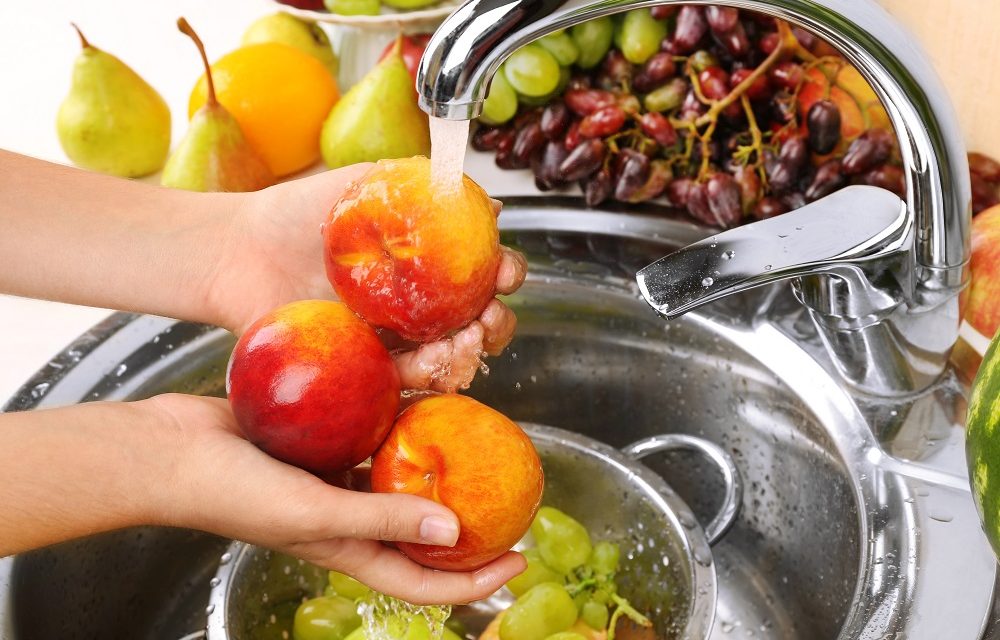Between your mom and the Food and Drug Administration, at least a few people have probably told you to always wash your fruits and vegetables so you don’t ingest filthy germs when you eat them.
But I have to admit, part of me always suspected the mandate was a bit of a scam, kind of like when people tell you to bundle up so you won’t catch a cold (this is not a thing!) or that cracking your knuckles will give you arthritis (also not a thing!). Rinsing an innocent little onion to prevent disease? The more I thought about it, the more it seemed like a conspiracy theory.
So, like Bob Woodward and Carl Bernstein before me, I set out to crack Watergate – only my intrepid mission involved reaching out to a few food safety experts to find out if you really need to wash your produce before you eat it.
It turns out, washing your fruits and vegetables really might help.
The Centres for Disease Control and Prevention recommends that you wash your produce to avoid food-borne illnesses like norovirus, which is America’s leading cause of disease outbreaks from contaminated food. Symptoms include nausea, vomiting, stomach pain and diarrhoea.
Apparently, experts agree that rinsing your fruits and vegetables really is effective in this regard. In doing so, you wash away physical contaminants like dirt, pebbles, insects and other lingering debris. (Anecdotally, I can say a lot of my produce comes coated in stuff I wouldn’t want to eat – like the little green worm I recently found coiled in the wrinkle of a spinach leaf.)
Take, for instance, green onions. “They’re like little straws – when you pull them out of the ground, it’s so easy for dirt to get down in there,” says Drew Patterson, culinary director of the Ohio State University Wexner Medical Centre and ServSafe instructor. Washing away that dirt could potentially prevent you from getting sick.
“You could get a food-borne illness if you eat a little chunk of dirt that happened to have a live strain of bacteria in it,” he says.
Dr Charles Gerba, a microbiology professor at the University of Arizona, agrees. “Washing fruits and vegetables can help remove microorganisms capable of causing disease,” he says.
That’s just one example of how harmful bacteria can weasel their way onto your food. Here’s another: From the time your vegetables are plucked from the ground, just think of how many hands they pass through. The farm workers loading them onto trucks; the grocery store employees stocking them onto shelves; the choosy shoppers manhandling them. Somewhere along the way, it is not unlikely that one of these people didn’t wash their hands properly after they pooped. And therein lies the rub – or rather, your one-way ticket to vomiting and diarrhoea.
So yes, washing your fruits and vegetables before you eat them does something. But here’s the bad news:
Even if you wash your produce, you can still get sick.
Washing your fruit removes some of that nasty bacteria – but not all of it.
“If you’ve got bacteria on the surface of fruits and vegetables, and you give them a wash with cold water, it removes some of what’s on the surface,” Brendan Niemira of the US Department of Agriculture told LiveScience in 2010. “Unfortunately, it [cold water rinsing] doesn’t remove all of them, and that’s a problem. If things are well-attached or living in a tight-knit community called a biofilm, that’s going to be hard to get rid of.”
If your lettuce is contaminated with E. coli, for instance, a good scrub under the faucet ain’t going to make much of a difference. In this 2017 study, researchers tried to wash E. coli off romaine lettuce and a ready-to-eat mixed salad blend. Though they were able to reduce the amount of bacteria on the lettuce, the remaining levels of E. coli were still too high to be considered safe.
Read more: Get all the nutrients your body needs by stocking your cupboard with these five foods
Here’s another bummer: If bacteria makes it past the outside of a fruit – be it through a porous surface, a crack or a bruise – your surface-level rinse isn’t going to do you any good.
The conclusion?
Sorry, but your mom was right. While washing your produce won’t protect you from every deadly food-borne illness, it has been shown to prevent some nasty things from getting inside your body. And since it doesn’t take much effort to rinse off your veggies, there’s really no good reason you shouldn’t be doing it.
“It can only provide positive benefits,” Patterson says. “You’re just building your safety net.”
This article was originally published on
www.mh.co.za
Jordyn Taylor
Fuente: www.health24.com
